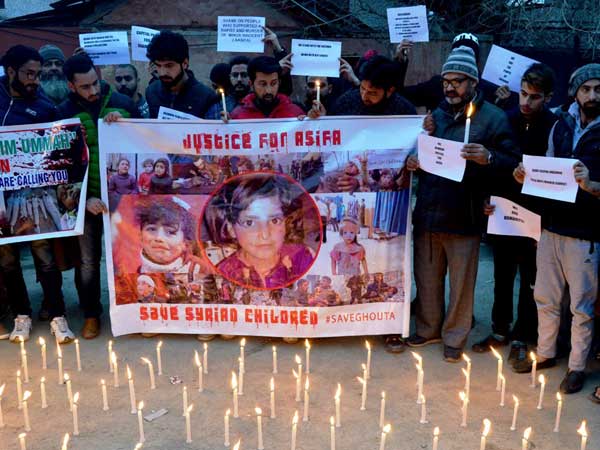
It is going to be the moment of truth for women — when all their patience wears out, what will they do. The retribution for Kathua and Unnao cannot be in another ‘Not in My Name’. Candlelight protests pack the quiet belligerence to speak truth to power, as they did after the Nirbhaya case in 2012. And before that in the Jessica Lall case. But, they are unable to triumph the establishment's ability to muddle, dilute, prevaricate and ridicule in a manner that buries injustice.
“Dented and painted” women who stood with Nirbhaya during the UPA regime are now “sickulars and libtaards” demanding justice for the Kathua and Unnao rape victims. Yet, a slow and tortuous pattern is emerging. Jessica Lall, Nirbhaya and now the Dalit victim in Unnao and the murdered Bakarwal child in Kathua are showing that the powerful can be defeated, especially when the battle is long and hard. The “dented and painted” women, the “sickulars”, the “libtaards” who, we were told, recoiled at the stench of Bharat, refused to buckle under the brazen efforts to shame them. This has been a bruising battle and will continue to be so. Like the Unnao girl, some may be driven to attempting suicide outside a chief minister’s home. Others may have their fathers killed in police custody for daring to speak up. Victory against the powerful has to be earned because nothing is more powerful than the state, so few are willing to go to battle against the establishment.
Fortunately, as the attempts to muddle continued, President Ram Nath Kovind spoke unequivocally on the issue, asking, against the backdrop of the Kathua case, what kind of society India is becoming. He spoke directly and without hedging, that we needed to see that Kathua does not happen again. It had the effect of healing and making up for the failure of the establishment to act on time and stopped the whispering campaign that the rape and murder of the eight-year-old concealed a story more sinister than had been revealed.
The two incidents in Uttar Pradesh and Jammu talked back to us about who we were. They told us about condoning depraved behaviour. They told us about hypocrisy – talking of women's rights and protecting their liberty but withdrawing into a cocoon of primal thinking when it cut too close to the bone.
So, this is the moment of truth, and a time for contemplation, with attacks on women showing no signs of abating – the discovery of an 11-year-old girl’s body with 86 injuries in Surat, the rape of a nine-year-old girl over 15 days in Rajkot, and others. When does the patience run out for women? Will it be signalled with pride and restraint, like in the US, in the 1950s when Linda Brown and her father Oliver fought segregation in public schools? Or like Rosa Parks shortly after, when she refused to vacate her seat in a bus because of her colour? Or will there be anger and an absence of restraint after each attack, perhaps vigilante action?
In January 2013, when the Shiv Sena distributed three-inch knives to its supporters in Mumbai, it was a barely-concealed call for vigilantism. In response to what the party described as the government’s failure to protect women, a Shiv Sena leader told the women, “The way you cut vegetables, cut the hand of the person who touches you the same way.”
Something far more organised in terms of vigilante action took place in the badlands of Bundelkhand, with the self-appointed agenda of stepping in where the government had failed women. That was the handiwork of Sampat Pal and her lathi-wielding all-woman gang in pink, the Gulabi Gang. Bundelkhand as an area was fertile ground for the Gulabi Gang to prosper with its history of poverty and overbearing patriarchy. The gang succeeded on the strength of the lathi, delivering justice in its own way.
Women will tell you that they are more often than not on an uphill road for a multitude of reasons – for being a Dalit woman, for being a woman belonging to a minority community, for being a poor woman, for being a modern woman, for being a working woman, for being a successful woman, for being an educated woman. In short, for just being a woman.
The silent message in the protests in the Jessica Lall and Nirbhaya cases, and in the Unnao and Kathua cases is that one victory will not necessarily lead to another. But they signify the evolution of morality on the status of women. The two cases have, in a way, precipitated a crisis of morality. In December 2012, as violent protesters took over Rajpath and Raisina Hill in Delhi, Pranab Mukherjee, one of India's most politically astute presidents, insisted on meeting them. It was grave concerns raised by his security detail that stopped him. Now, President Kovind has spoken sagely on the issue. His comments could not have been more timely. However, his expression of anguish cannot camouflage a bitter truth: that what we are witnessing is a struggle between the collective derangement of those drunk on power against the moral authority of those who stand against them. It shows that morally we are stretching at the seams. We need to reflect on this and act. Quickly.
ananda.majumdar@mydigitalfc.com





